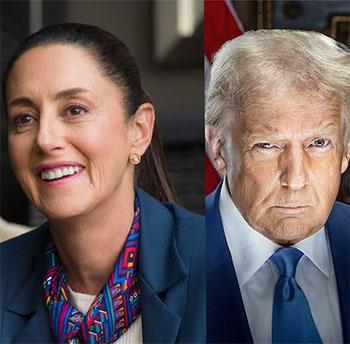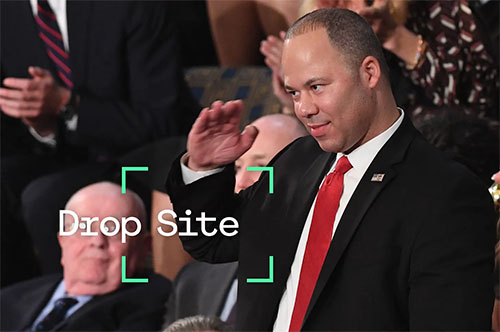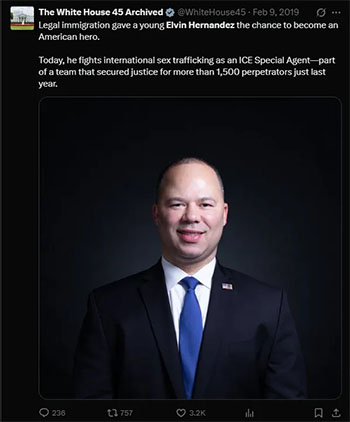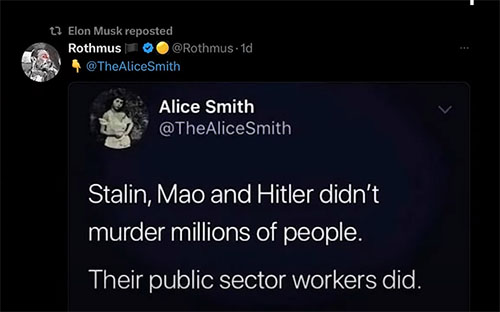by Marc Elias and Jamie Raskin
Democracy Docket
Mar 13, 2025 Defending Democracy — Complete Podcast
[Marc Elias] So let me start with something that I don't understand. So you got Article I of the Constitution, which is the Congress, and lays out Congress's power; and you got Article II, which lays out the Executive Branch's power; and you got Article III that lays out the Judicial branch. And I think the Founders had in mind that the most powerful of these branches would actually be the first, would be Article I, right? It would be Congress. And that it would jealously guard its authority -- particularly its ability to spend money, and its ability to issue taxes -- that it would jealously guard this power from a rapacious Executive. That does not seem to be happening. So what do you make of this? Either put on your Constitutional law hat, or put on your member of Congress hat, but what do you make of this?
[Jamie Raskin] Well, in one sense, this is a decades-long process of erosion of Congressional lawmaking power. But this is a dramatic and sudden jump into the unknown, with the President basically defying Congress in Congressional statutes and Appropriations at every turn. But to go back to the beginning, Marc, look, we had a revolution against a king, against a monarch. The first three words of the Constitution are, "We the people." And then, after you get through our beautiful Preamble, it leads right into the creation of Article I: "All legislative power is vested in the Congress of the United States." The sovereign power of the People to create the Constitution flows right into the Congressional power of lawmaking. And you know, Article I lays out everything, from regulating Commerce domestically and internationally, to the power to declare war, budgets, taxes, you name it. And even in Article 1, Section 8, Clause 18, all other powers necessary and proper to the execution of the forgoing powers, right?
Then you get to Article II. My colleague, Jim Jordan's, been running around TV saying that Article II says, in the first sentence, "All Executive power is vested in the President." Yeah, that's true, but what is the executive power, right? When you get past commander-in-chief of the Army and Navy in times of actual conflict, or when the militia's been mobilized, what's the core job of the President? "To take care that the laws are faithfully executed." That's it. "To take care that the laws are faithfully executed." The Articles of Confederation didn't even have a President, right? And then they thought that that was too inefficient, and there was nobody to keep things going to, you know, move the bureaucracy when Congress wasn't in town. And then the President was created, but very clearly in a secondary position. As Madison put it in the Federalist Papers, "The legislative branch is the predominant branch of government."
So sometimes my colleagues will get up, even Democrats will say, "We're three co-equal branches of government." And I just want to say, first of all, "co-equal" is not even a word, okay? You know, that's like extremely unique, or something like that. Secondly, the claim that we have three equal branches is just ridiculous. I mean, when you get to Article II, you've got four short sections. One section is all about how you impeach a President for treason, bribery, and other high crimes and misdemeanors. If we're co-equal, or equal, or equivalent, or whatever, why do we have the power to impeach and try and convict a president, and he doesn't have the power to impeach and try and convict us? The framers were clearly a lot more afraid of a President purporting to be a King, or arrogating the powers of a dictator, than it was afraid of Congress; all of the people, coming from this great huge, vast, diverse country, from different points of views, and working together, and split between the House and the Senate with bicameralism. So, as you know, Washington told Jefferson in that famous anecdote,There is a tradition that Jefferson coming home from France, called Washington to account at the breakfast-table for having agreed to a second, and, as Jefferson thought, unnecessary legislative Chamber.
"Why," asked Washington, "did you just now pour that coffee into your saucer, before drinking?"
"To cool it," answered Jefferson, "my throat is not made of brass."
"Even so," rejoined Washington, "we pour our legislation into the senatorial saucer to cool it."
It's like, you know, pouring your tea from the cup into the saucer so it can cool off a little bit, right? And the Senate is supposed to allow the passions and tempers of the House of Representatives to cool off a little bit. But in any event, Congress is the lawmaking branch. We also have the power of the purse. We've got the power to spend, right? And you know this Marc, an Appropriations Act is just another federal law. It's like a law against assaulting Federal officers. And they should show more respect for both the law against assaulting Federal officers, and for an Appropriations Act. An Appropriations Act is not a budgetary recommendation, or a point of negotiation, or a bargaining chip with the President. It's a law you follow. The law "To take care that the laws are faithfully executed." So do your job, yeah?
-- What Every American Can Do To Fight DOGE, by Marc Elias and Jamie Raskin, Democracy Docket, Mar 13, 2025
Maryland Congressman Jamie Raskin joins Defending Democracy to discuss the state of democracy, how Republicans are ceding their constitutional powers and the one action every American should do to protest DOGE.
Transcript
Donald Trump has seized congress's
constitutional power but Republican
leaders are giving it to him
representative Jamie Rasin is here to
discuss welcome back to defending
democracy I'm Mark Elias let's get
started Congressman Rasin welcome back
to defending democracy uh thank you for
having me Mark delighted to be with you
of course all right so I need everyone
to hear from you because you are both
the foremost uh scholar in the Congress
about congressional power the
Constitution executive branch power and
also you're just a super smart member of
Congress who understands how the body
works.
So let me start with something
that I don't understand. So you got
Article I of the Constitution, which
is the Congress, and lays out Congress's
power; and you got Article II, which lays out
the Executive Branch's power; and you got
Article III that lays out the
Judicial branch. And I think the Founders
had in mind that the most powerful of
these branches would actually be the
first, would be Article I, right? It would
be Congress. And that it would jealously
guard its authority -- particularly its ability to
spend money, and its ability to
issue taxes -- that it would jealously
guard this power from a rapacious
Executive. That does not seem to be
happening. So what do you make of this?
Either put on your Constitutional law
hat, or put on your member of Congress
hat, but what do you make of this?
[Jamie Raskin] Well, in
one sense, this is a decades-long process
of erosion of Congressional lawmaking
power. But this is a dramatic and
sudden jump into the unknown, with the
President basically defying Congress in
Congressional statutes and
Appropriations at every turn. But to go
back to the beginning, Marc, look, we had
a revolution against a king, against a
monarch. The first three words of the
Constitution are, "We the people." And then,
after you get through our beautiful
Preamble, it leads right into the
creation of Article I: all legislative
power is vested in the Congress of the
United States. The sovereign power of the
People to create the Constitution flows
right into the Congressional power of
lawmaking. And you know, Article I lays
out everything, from regulating Commerce
domestically and internationally, to the
power to declare war, budgets, taxes,
you name it. And even in Article 1,
Section 8, Clause 18, all other powers
necessary and proper to the execution of
the forgoing powers right?
Then you get
to Article II. My colleague, Jim
Jordan's, been running around TV saying
that Article II says, in the first
sentence, "All executive power is vested
in the president." Yeah, that's true, but
what is the executive power, right? When
you get past commander-in-chief of the
Army and Navy in times of actual
conflict, or when the militia's been
mobilized, what's the core job of the
President? "To take care that the laws are
Faithfully executed." That's it. "To take care that the
laws are Faithfully executed." The
Articles of Confederation didn't even
have a President, right? And then they
thought that that was too inefficient, and
there was nobody to keep things going
and to, you know, move the bureaucracy
when Congress wasn't in town. And then
the President was created. But very
clearly in a secondary position. As
Madison put it in the Federalist Papers,
the legislative branch is the
predominant branch of government. So
sometimes my colleagues will get up, even
Democrats will say, "We're three co-equal
branches of government." And I just want
to say, first of all, "co-equal" is not even
a word, okay? You know, that's like
extremely unique, or something like that.
Secondly, the claim that we have three equal
branches is just ridiculous. I mean, when
you get to Article II, you've got four
short sections. One section is all about
how you impeach a President for treason,
bribery, and other high crimes and
misdemeanors. If we're co-equal, or
equal, or equivalent, or whatever, why do
we have the power to impeach and try and
convict a president, and he doesn't have
the power to impeach and try and convict
us? The framers were clearly a lot more
afraid of a President
purporting to be a King, or arrogating
the powers of a dictator, than it was
afraid of Congress; all of the people,
coming from this great huge, vast, diverse
country, from different points of views,
and working together, and split
between the House and the Senate with
bicameralism. So, as you know, Washington
told Jefferson in that famous anecdote,
It's like, you know, pouring your tea
from the saucer into the cup so it can
cool off a little bit right. And the
Senate is supposed to allow the
passions and tempers of the House of
Representatives to cool off a little bit.
But in any event, Congress is the
lawmaking Branch. We also have the power
of the purse. We've got the power to
spend, right? And you know this Marc, an
Appropriations Act is just another
federal law. It's like a law against
assaulting Federal
officers. And they should show more
respect for both the law against
assaulting Federal officers, and for an
Appropriations act. Appropriations Act is
not a budgetary
recommendation, or a point of negotiation,
or a bargaining chip with the president.
It's a law you follow. The law to take care
that the laws are Faithfully executed; do
your job, yeah?
[Marc Elias] And I want to emphasize
one thing you said uh and and add a
little bit to it you know you point out
that the impeachment power both for
article one and article three the
Judiciary rests solely with Congress and
there is no parallel. The
president cannot remove members of
Congress. The Judiciary can't actually
remove members of Congress. People always
ask me you know why is it that you know
so and so can be convicted of a crime and
they can still run for Congress; so they
can still be in Congress. And the answer
is because only Congress can decide who
in more specifically each chamber decide
its members and there is an opinion that
is according to the Constitution that's
the qualifications Clause correct the
qualifications clause and I was about to
say there's actually very um uh
insightful uh opinion by then circuit
court judge Scalia later Justice Scalia
in which he basically says that this is
a power that is rest that the power to
remove members of Congress rest solely
with their B their members under the
qualifications clause and that it has to
be that way and he explains why it has
to be that way because you could not
have member you could not have the
ability to destroy Congress uh rest any
place else uh by through its
qualifications and that that is uniquely
because of Congress that's uniquely
because of the place Congress plays in
the in the Constitutional scheme so I
agree with all of that but answer me
this that is all true as a matter of
constitutional law why is that not a
matter of political will right now I
mean if you are the speaker of the house
you are the third to in line to the
presiden of United States I mean it was
you know I I am you know old enough to
remember all the way back to Nancy
Pelosi being the speaker and speakers
before and you know she was as tough as
they come um and you know could be uh
could be a partisan but she jealously
guarded Congressional prerogatives even
against democratic presidents and that
was true with tip O'Neal it was true you
know I'd say even with the new ginges of
the world uh you know why has why has
that changed like why is Speaker Johnson
just not willing to assert house
prerogatives because it really is even
within Congress the house has certain
prerogatives that the Senate doesn't
have and why is he so willing to just
say well whatever Donald Trump wants
like that's just the way it is part of
the answer to that is the ethical
collapse of the Republican Party um we
saw what happened to anyone who
dissented were
opposed Donald Trump's autocratic
Ambitions we saw what happened to Liz
jany we saw what happened to Adam k ger
Mitt Romney you name it I mean there
were 10 Republican house members uh who
voted to impeach there were seven
Republican Senators who voted to convict
and the vast majority of them are gone
um and that's almost Donald Trump's uh
prominant uh motivation I mean probably
after making whatever money he can make
in office it is making sure that
everybody follows him that's more
important to him than even being in the
majority he wants to have absolute
control control over their party so part
of that you know does demonstrate the
the complete
deterioration of GOP ethics and support
for uh Congress as a branch I mean
Madison really thought that members of
Congress would identify with legislative
interests and the Judiciary would defend
zealously the judicial interest and the
executive the executive interest but
what we have now is people who are loyal
to
uh the institution of the political
party before the formal constitutional
institutions in some sense um this has
been a dynamic and a problem since the
very beginning of the Republic I mean
our constitution was written famously
against political parties political
parties aren't mentioned in the
Constitution much less a two-party
system um their existence is implied or
Allowed by the First Amendment to the
Constitution with Association and
assembly and speech and so on um but
from the very beginning political
parties began to form in the country you
know the Federalists and the Democratic
Republicans and so there's always been
that partisan or factional Spirit as the
FR Founders described it but it's really
gone off the deep end uh at this point
where you've got one party that would uh
Elevate its own interests and its own
agenda above the Constitution itself
and uh you know that's why people like
Liz Cheney and Adam Kinser and Mitt
Romney in my book continue to be heroes
because they were willing to stand in
the breach when that was happening and
there are precious few Republicans left
certainly in public office who were
willing to do that now yeah we'll be
right back with more of my conversation
with Congressman Rasin in a moment but I
want to take a second to ask you to
subscribe to democracy duckets free
daily and weekly newsletters you'll get
the most important news and updates you
need to know about the fight for
democracy in court it's short
informative and I promise you the best
thing you'll read in your inbox sign up
now for free at the link above or in the
description below yeah so I want to talk
about the other uh folks who should be
in the breach protecting democracy um it
is interesting to me uh distressing uh
that Donald Trump seems to have targeted
um the independent agencies uh uh uh and
in particular he started with Watchdog
officials so he started with uh the nlrb
the Merit systems protection board the
office of special counsel which is the
Hampton which Hampton Dinger uh people
may know he litigated uh to protect his
job the inspector's General were fired
um and so what do you do you think it is
uh no coincidence as I do that that he
seems to have taken a particular
interest in getting internal Watchdogs
off the
beat well yeah I mean that was um agenda
item number one when they got in office
of course they sacked immediately 17 and
later 18 inspectors General I mean these
are the real corruption Fighters as you
know these are the real people fiing out
waste fraud abuse corruption
self-dealing Kickbacks and so on in
federal departments and agencies and
that's very difficult
painstaking comprehensive work that
takes huge staffs of people and when you
do it you bring in forensic Auditors and
accountants you don't bring in computer
hackers who go and get everybody's data
um and so they sacked the real
corruption fighters in the government
they cleared them out of the way they
dismantled uh enforcement of the Foreign
Corrupt Practices Act they disbanded
numerous uh task forces in the
Department of Justice like the anti
kleptocracy uh task force which were uh
designed to stop foreign Corruption of
American politics and business um and
then um they basically unleashed the
Doge people on all of our data in all of
the Departments and uh all of the
agencies um and so um you know the Elon
Musk and his the band of uh uh computer
hacker juvenile night Raiders these
people uh are not opponents of
corruption they're instruments of
corruption and lawlessness against the
rights of the people um so I have y two
questions about that the first is as a
law professor how do they fit into or
don't fit into the Constitutional
structure and number two what can people
do about it because people like are
people are worried that their data has
been compromised like people are like I
mean average Americans I don't mean like
just like you know members of Congress I
mean like you know average Americans are
petrified that their information I'm
sure you heard from your constituent so
how does how does Doge like fit into
what you described at the beginning of
an AR start with and then what could
people do I'm very glad you raised it
because yesterday the United States
district court for the District of
Columbia uh rendered yet another victory
for the forces of democracy and freedom
they found that doge is in fact a
federal agency some something that uh
Doge was resisting uh and yet uh the
federal district court and judge
Cooper's courtroom found that DOI is a
federal agency and it's subject to
federal laws specifically the Freedom of
Information Act so um the last thing I
did before I got on this call with you
Mark was I um completed filling out a
form the whole thing took me less than
five minutes maybe six minutes to do um
a form demanding
of Doge the department of government
efficiency which in my neighborhood we
call it the dissing our government
employees statute but I was demanding of
Doge and Elon Musk that they turn over
to me all the data they have on me from
the Social Security uh Department from
the Department of Education college
student loans anything they would have
from any federal department that they've
assembled I want to see it and guess
what I've got a right to see it and I
want to know whether they've made it any
changes to it I have a right to
determine whether everything in there is
accurate or if there are inaccuracies to
tell them to change it and I also want
to know whether it's been diverted and
leaked out to any thirdparty Source
whether it is uh Elon musk's artificial
intelligence program grock or any other
business I have a right to know that
that's my data and guess who else has
that right 340 million Americans and for
the cost of a stamp you can write in to
the Department of government efficiency
fill out their form and say give me all
this information now I don't know if
doge is set up to answer foyer requests
I don't think they were thinking a lot
about the public interest but hey uh
this is the magic um and the Paradox of
being part of government there are
people who want to go into government
because they can get as much as they can
out of it that's Elon Musk right but
there are benefits that go there burdens
that go along with the benefits and one
burden is you take control over our data
you tell us what data you've got and you
show us exactly uh what you have this is
our government that's our data uh and we
have a right to know well that's uh
great actual information for everybody
to to hear what the congressman is
saying is not just him because he's a
member of Congress who's entitled to
this but everyone is entitled to this
information so it's something that
anyone can do well everywhere I go
marker saying what can we do what can we
do and you know uh people go to rallies
and then the next minute they're saying
what can we do here's something every
American can do and ought to do get your
foyer request in under the Privacy Act
for your private information that may
have been seized by Elon musk's
Department of government uh efficiency
Doge and then uh we can take it from
there and if they don't respond well
we'll have to deal with that at that
point the other thing that people are
asking about and I don't want this to
turn too wonky but you are con tion law
professor um people are worried that he
seems to be able to fire people who are
not supposed to be fired like on the one
hand they hear that like there are
people who are protected from arbitrary
firing um they hear that you know that
there are these independent agencies and
boards and yet he seems to be firing
these people and they want to know isn't
there some Court like isn't isn't there
some court case or something that says
he can't do this all right so I I want
to answer both about the boards and
agencies and that involves a case called
Humphrey's executive but I want to
answer just about all of the federal
workers the tens of thousands or
hundreds of thousands now of federal
workers who've been sacked okay first on
the members of federal agencies and
Boards like the Securities and Exchange
Commission the Federal Trade Commission
the Federal elction Federal Election
Commission that's a critical one um on
of these things um basically since the
New Deal um there has been a Doctrine
which has said that while the president
gets to absolutely nominate his own uh
cabinet secretaries and his political
subordinates with under his budget his
executive budget he does not have the
right to hire and fire the members of
these bipartisan boards and agencies
those exist under Congressional statute
and they have some quasi legislative
powers by which the court is meant Ru
making Powers um they have some quasi
executive powers they can enforce rules
um whether it's you know the SEC
enforcing rules against insider trading
or the Federal Election Commission uh
enforcing rules against um illegal
campaign expenditures okay um but also
they have quazite Jud judicial powers in
that they can rule on particular cases
that come before them okay so um this is
this has been identified with the rise
of the administrative state which has a
very you know nefarious Sinister sound
in the uh Steve Bannon era but the
administrative State basically makes it
possible to govern a country of hundreds
of millions of people and make sure that
people's rights are Vindicated Within
These agencies within the bureaucracies
if they have a problem they're able to
go to it and um and the agencies in turn
are able to enforce the public interest
well now um Donald Trump is advancing a
federalist Society Dogma um called the
unitary executive which is that uh all
of these agencies all of these boards
are directly under the control of the
president and the president can uh hire
and fire everybody so one of the first
things he did got in office this time
was he sacked all of the Democrats who
sered for example uh on the Federal
Election Commission uh or the Federal
Trade Commission and so on he sacked all
of them saying that was under his
unilateral control they seem like
they're chomping at the bit to get this
question before The Supreme Court where
they believe they have a sympathetic
majority um the rationale for allowing
this before was that um that the
president's job is to take care that the
laws are Faithfully executed there are
laws setting up these boards and
agencies and none of those boards or
agencies in any way interfered with the
essential powers of the president and
the executive um but now they want to
say no basically they're under the
vertical control of the president so
we'll see if that happens it will it
will be uh a
landslide uh reversal and turnabout in
terms of administrative law and public
law in America to say I mean imagine if
uh president Trump actually controlled
the Federal Election Commission he would
obviously use it to attack all of the
Democrats the way he's using the
Department of Justice right now and to
go after his political opponents and if
uh if F found anything done wrong by one
of his uh supporters one of his allies
he would immediately force them to drop
the charges the way he's doing with
mayor Adams in New York who's decided to
cut a deal with Donald Trump and you
know he was willing to lose six or seven
top Conservative Republican
prosecutors um rather than just follow
the law no the president cannot make a
trade for someone in order to uh destroy
a grand jury indictment you can't engage
in that kind of political negotiating so
um but we're watching this and you know
I know that the members of the boards
and agencies will be defending and the
Democrats will be defending the laws as
they've existed of course Trump has more
broadly been trying to sack tens of
thousands of federal workers with the
idea of basically destroying the
functions of the federal government I
mean the Consumer Financial production
Bureau has saved American consumers more
than $21 billion in uh credit card late
charges in Bank overdraft fees all of
these rapacious or ripoff charges that
large corporations pasted on people in
addition to more uh elaborate schemes
against the consuming public uh but they
want to dismantle it I mean in fact
there are hundreds of millions of
dollars right now Mark that are
frozen because the cfpb workers were
told they can't do any work they
literally can't sign a letter turning
this money over to Consumers who have a
lawful right to it so we're going to try
to unlock all of that but the bottom
line is that all of this is an assault
in the Civil Service the core meaning of
the Civil Service is that people can
only be fired for poor professional
performance or professional misconduct
you know for stealing money or for not
doing their job but the people who are
being sacked have been doing a fantastic
job they have Superior evaluations my
guess to the to the Joint session of
Congress where Trump came and spoke was
a a doctor from NIH who's a uh a
pediatric cancer biologist and she'd
been there for several years as a
postgraduate student she did so well and
had such excellent performance rating
she was promoted to the job of top
biologist there and by virtue of being
promoted she was a a probationary
employee which sounds like there's
something wrong all it means is you've
been promoted but the Doge people used
that as a reason to um sack her as part
of the Valentine's Day Massacre and
they're people like that strewn
throughout the federal government I mean
we're talking air tra air traffic
controllers Food and Drug safety uh
inspectors um you know Forest Service
firefighters um all these people have
just been randomly sacked as they try to
hack away at the federal Workforce and
the last point I'll make about this is
you know people really ask why why is
this happening to us I mean if Vladimir
Putin came here and took over the US
government he would be doing nothing
different than what these people are
doing to us right now well if you really
read into Elon Musk and um his friend
Peter teal and their intellectual Guru
named Curtis yarvin these people believe
that democracy's defunct they believe
we're living in a post-constitutional
America the US Constitution they think
is Obsolete and we're in the middle of a
regime change where we're going to move
into some kind kind of monarchical
autocratic
technate and uh guess who's there to be
in charge of it none other than Elon
Musk who could never run for president
because he wasn't born in the United
States he was born in apartheid South
Africa and grew up there and shows
because those are the kinds of attitudes
that now permeate not just Doge but
large parts of uh of the new
Administration but check out the
interview with Curtis yarvin that was in
the New York Times about a month ago
where he said the American people have
got to get over their fear of the word
dictator a dictator he assured us is
just what uh president CEO of a company
is and just as we have dictators in
private corporations we need a dictator
in the corporation that is the US
government and that government serves
primarily the presidents and CEOs of all
these corporations it's a dictator
serving dictators Congressman Jamie
Rasin one of my personal Heroes the
smartest most
astute Observer of the Constitution
Congress and uh uh and politics thank
you for joining me today dear mark thank
you for everything you're doing for us
every day man really all right thanks
for tuning in to this episode of
Defending democracy make sure you're
subscribed to democracy dockets free
daily and weekly newsletters to stay
informed on the latest voting rights and
democracy news we'll see you next time






